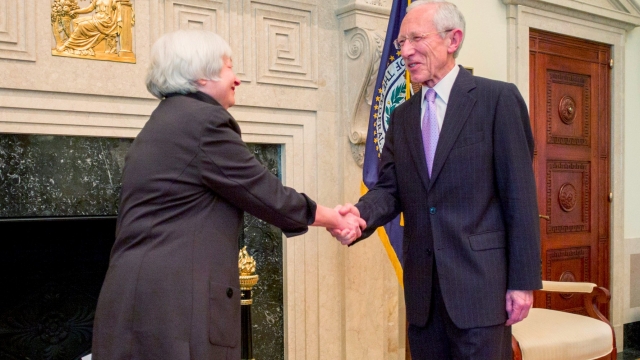
Trump needs to make another key appointment as Janet Yellen’s right hand man steps down
http://ift.tt/2ib6Fu2
Reuters/U.S. Federal Reserve/Handout via Reuters
Today is Stanley Fischer’s last day as the Federal Reserve’s No. 2 official, leaving yet another open spot on the central bank’s powerful board of governors for President Donald Trump to fill.
Trump has yet to name a replacement for Janet Yellen, whose term ends in February, although he is reported to be close to making a decision, and seems to be wavering between ex-Morgan Stanley banker and Fed governor Kevin Warsh and ex-Carlyle Group executive and current board member Jerome Powell.
Given the overwhelming volume of pending items on the president’s current political and legislative agenda, including tax cuts and the botched disaster response in Puerto Rico, the Fed’s vice-chairmanship may not be high on the White House’s list of priorities. In other words, it could be a while.
Randall Quarles, Trump’s pick for the new position of Fed vice chairman for bank regulation, was recently confirmed by the Senate.
Fischer, 73, surprised everyone last month when he announced he would be stepping down well before the completion of his term, which was not supposed to end until June of next year. He cited personal reasons for his departure.
Fischer is considered the leader of a generation of prominent academic and professional economics, in part because he taught many of them at Massachusetts Institute of Technology.
"He is often referred to as the dean of central bankers, having taught most central bankers including former Fed Chairman Ben Bernanke and European Central Bank president Mario Draghi," Shawn Baldwin, the chairman of AIA Group, wrote in a LinkedIn post after Fischer’s announcement.
"Fischer’s departure creates a vacuum not easily filled, adding to the uncertainty in monetary policy."
Larry Summers, the Harvard economist and former Treasury secretary, dubbed Fischer’s resignation "the end of an era."
Fischer, who was born in Zambia and later studied in London, started his career as an academic but became a policymaker at the World Bank and later the International Monetary Fund, where he rose to the role of first deputy managing director. Fischer then spent three years at Citigroup as a vice chairman before moving to Israel in 2005 to become the head of its central bank. Fischer returned to the US as Fed vice chairman in 2014.
Not everyone is complimentary about the arc of Fischer’s career. To some, he represents the kind of establishment economics that led to financial instability and income inequality in many parts of the world.
During his time at the IMF, Fischer became the face of austerity measures gone wrong. Many of his and the IMF’s recommendations for drastic spending cuts during the Asian financial crisis of the late 1990s have since been widely discredited as having made matters worse.
NOW WATCH: Traders are gearing up for Trump’s tax cut plan
See Also:
- Fed president James Bullard tells us why he disagrees with his colleagues about the need for more rate hikes
- The Fed is worried that it won’t achieve one of its key objectives for a while
- A report coauthored by a People’s Bank of China researcher says China’s economy is about to hit a wall
business
via Business Insider http://ift.tt/eKERsB
